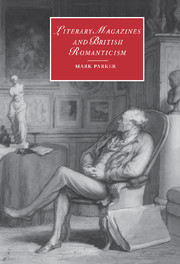Book contents
- Frontmatter
- Contents
- Acknowledgments
- Introduction: the study of literary magazines
- Chapter 1 Ideology and editing: the political context of the Elia essays
- Chapter 2 A conversation between friends: Hazlitt and the London Magazine
- Chapter 3 The burial of Romanticism: the first twenty installments of “Noctes Ambrosianae”
- Chapter 4 Magazine Romanticism: the New Monthly 1821–1825
- Chapter 5 Sartor Resartus in Fraser's toward a dialectical politics
- Conclusion
- Notes
- Bibliography
- Index
- Cambridge Studies in Romanticism
Chapter 4 - Magazine Romanticism: the New Monthly 1821–1825
Published online by Cambridge University Press: 22 September 2009
- Frontmatter
- Contents
- Acknowledgments
- Introduction: the study of literary magazines
- Chapter 1 Ideology and editing: the political context of the Elia essays
- Chapter 2 A conversation between friends: Hazlitt and the London Magazine
- Chapter 3 The burial of Romanticism: the first twenty installments of “Noctes Ambrosianae”
- Chapter 4 Magazine Romanticism: the New Monthly 1821–1825
- Chapter 5 Sartor Resartus in Fraser's toward a dialectical politics
- Conclusion
- Notes
- Bibliography
- Index
- Cambridge Studies in Romanticism
Summary
Before examining the third great literary magazine of the 1820s, the “New Series” of Henry Colburn's New Monthly, a brief recapitulation of the aims and formal features of its rivals, Blackwood's and the London, is in order. Literary magazines, as we have seen, provide distinct versions of the world and embody distinct kinds of Romanticism. John Scott, the editor of the London, sought to go beyond mere “intelligence” and to “catch, condense, and delineate” what he termed “the spirit of things generally” (London Magazine I [1820], V). He sets out his intentions with his usual candor in a “Prospectus,” which he follows closely until his death fourteen numbers later. Blackwood's, characteristically, has no prospectus, and its self-descriptions appear after-the-fact, if not simply tactical or occasional. Nevertheless, Odoherty's designation of the magazine in the fourth installment of “Noctes Ambrosianae” as a “classical work” (Blackwood's 12 [1822], 106) marks out the essential difference between these two magazines: the bias of Scott's London is toward representation; that of Blackwood's is toward performance.
Hence the spirit of the early numbers of the London is, above all, critical and objective. In it, John Scott seeks to balance an Enlightenment sense of order, one that emphasizes reason, clarity, analysis, objectivity, and balance, with a characteristically Romantic emphasis on sensibility, resulting in what I have termed a Burkean–Coleridgean literary culture.
- Type
- Chapter
- Information
- Literary Magazines and British Romanticism , pp. 135 - 156Publisher: Cambridge University PressPrint publication year: 2001



